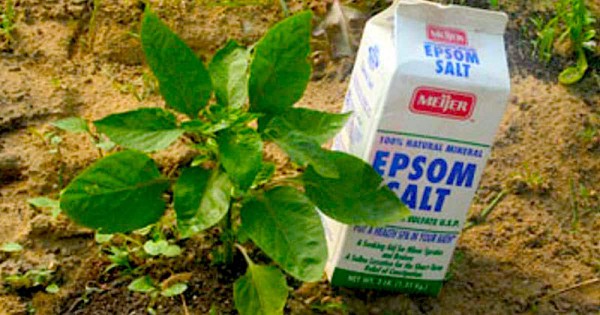Epsom salt has a high content of magnesium, and this is the main reason why it is used to relieve aches and pains. However, besides being used in the case of aches and pains, Epsom salt is a great garden additive, recommended by a great number of expert gardeners.
Most plants are being grown in soil, severely depleted in magnesium. Because of this, we as consumers can experience magnesium deficiency for eating foods poor in this mineral.
Being a great source of minerals, Epsom salt can help produce healthy and rich plants.
How to incorporate Epsom Salt to your plants:
- Pre-Planting Plant Preparation:
You should stand the root of your new plants in a gallon of water with half a cup of Epsom salt. Epsom salt will strengthen the roots during this stage, thus improving the chances of green and healthy growth.
- When Planting Seedlings:
Add 1 tablespoons of Epsom salt with dirt in order to fill out the hole dug out for your new plant. Epsom salt has the ability to improve the production chlorophyll, essential for the plant. This will help the plant to adapt better to its environment.
- When Preparing Soil For Planting:
You should sprinkle 1-2 cups of Epsom salt for every 50 square feet of soil. Before planting, make sure to mix them well into the soil.
- During Growing Season:
Dissolve half a cup of Epsom salt for every gallon of water. Use this water to water your plants. Pour at the base of the plant and let it to soak into the ground. Repeat this procedure during the growing season.
More Reasons to Use Epsom Salt in Your Garden
According to expert gardeners, these are the reasons why you should use Epsom salt on your plants:
- Assists The Soil In Absorbing More Key Nutrients
Adding Epsom Salt to the soil will help the plant in absorbing the essential nutrients. When the plants will absorb the nutrients more effectively, they will be able to produce greater and more flavorful yields. In other words, you will not need to buy expensive fertilizer and will save a lot of money.
- Produces Juicier And Sweeter Fruits
Epsom salt can boost the production of chlorophyll, thus providing the plant with more energy. In this way, plants will be able to produce juicer, sweeter, and fully nutritious fruits.
- Prevents Weed And Pests
Even though it is beneficial for humans and plants, Epsom salt is an irritant to pests. You should sprinkle Epsom Salt on the places where there are snails and slugs. This will keep them away, and will not damage your plant.
In order to kill weeds, you should mix 2 cups of Epsom salt to one gallon of water, 1 small capful of liquid dish detergent, and 1 cup of vinegar. Put the mixture in a spray bottle and spray on the base of weeds. Make sure not to spray the mixture on your plants!
- Keep Plants Green And Healthy
In order to perform their functions effectively, plants need magnesium. When plants experience a magnesium deficiency, their leaves will become lighter green to yellow in color. So, adding Epsom salt will supply minerals to the plant. In this way, the plant will be able to produce greener foliage, sturdier and healthier. The flowers will also have richer, darker and deeper colors and will look more attractive.
Source: Juicing For Health
